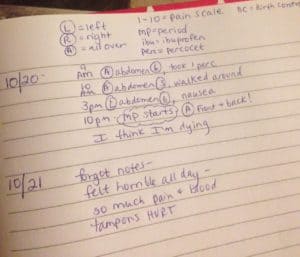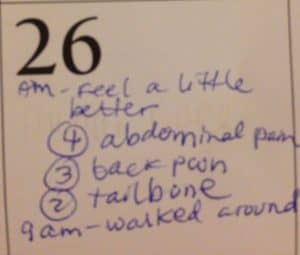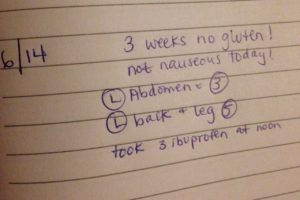Prepared, Clear, and Bold: How to be heard at the doctor’s office
Do you ever feel as though you are not heard or don’t even know what to say when you talk to a doctor?
You’re sitting at the doctor’s office feeling a little nervous. You already were weighed and your blood pressure taken and now you sit, looking past your disposable paper skirt and the stirrups where you will soon be placing your heels. The doctor finally comes in. After some fairly awkward small talk, she finally says, “Okay, so what brings you here today?”
You’ve been meaning for a long time to look for help, and this is the day.
“I’ve had really bad pain for a long time now”, you explain.
“Where is the pain?” she asks as you lie back and she presses on your tummy.
“Mostly here and here”, you point. “And…”
The doctors unknowingly cuts you off and says, “And how long have you had the pain?”
“Um… A long time… it comes and goes. And sometimes it hurts over here…”
She seems focused on a brief suspicion of it being your appendix but quickly realizes it is not.
“Okay so, on a scale of ten, how would you rate your pain?” she asks.
“Sometimes it’s a 5… sometimes it’s a 10… it’s all over the place”, you stammer.
“Well, how often is it a 5 and how often is it a 10?”
At this point, you do not even know what to say. What kind of question is that anyway? You are a busy person and do not remember every single moment of every single pain. You have some very vivid memories of really bad times, but even though your pain is frequent, there is really no possible way to be able to answer your doctor’s questions well.
The doctor visit begins to feel like a futile interrogation. Your “little bit nervous” has become a full panic.
She asks, “are there any other symptoms?”
“uhhhh….” Your mind goes blank. “Why am I even here?” you cry inside. There is an issue you had psyched yourself up to talk about, but now in your panic you feel too embarrassed to bring it up. “It’s probably not related anyway,” you convince yourself. And in this brief panic, you forget to mention how it hurts when you pee and that your side feels glued together inside.
The pain is what finally motivated you to come in, but your inability to answer your doctor’s questions has made you freeze. “Why am I even here? I’m probably just a hypochondriac… I don’t want to be here…”
Your doctor finishes pressing on your tummy, does a pelvic exam, and does an ultrasound. Nothing very interesting stands out, so there is no real diagnosis.
How could this doctor visit have gone differently? By being prepared, clear, and bold.
By being prepared, clear, and bold means that you are essentially presenting a case. Your doctor has a set amount of time dedicated to each visit and is going to want to know certain things that you must confidently present. “That doesn’t seem like something I can do”, you may be thinking.
It is something you can do. Here is how:
Keep a designated calendar, a notebook, or use an app (we prefer any option that allows for creativity and is easy to remember to use).Every day, take a few minutes total to document your symptoms even if they do not seem related. Include your own personal pain scale numbers for each point of pain and any medicines or other treatments you try and how they affect you. A morning entry might look something like this:

or like this…

Another entry you might be like this

or this…

The idea here is to briefly but clearly define moments and days to the best of your ability. Some days will be very thorough and some days will not. That is okay. Your effort is what counts. Capture your symptoms, pain scale ratings, medications, times, and activities.
As you do this, you will start to have a clearly-documented picture of what is going on. You will be able to piece things together more clearly and step forward with new confidence.
Without this system, it is easy to forget about, belittle, or dismiss some previous days. Endometriosis is a condition that plays mindgames. These mindgames are fueled by society, myths, and our own deepest fears.
This system can renew your strength and back you up when you really do not know what to say. You are writing your history and it is your truth. Nobody can deny your written story, so bring it with you when you go back to a doctor. Bring anything that helps remind you, without a doubt, the same things you know when you are unable to stand up straight or you are in the tub and your medication is not working. It will help you to confidently remember how you felt at that holiday party or how you felt after your last pelvic exam. It is all important. It ALL deserves to be documented.
Always create, especially when you are not well. Always write down in advance, the key points of your research. Write down what you feel you will never be open to doing. What down what you do want. Write down questions you want to ask your doctor? If it is too uncomfortable asking them in person, email them. Be kind, but out your health first. You cannot let anyone else’s beliefs, theories, attitudes, or ego stand between you and your chance of remission. Promise this to yourself. Always soak up any moments of confidence you possess.
________________
As before, imagine that you are at a doctor’s appointment. This time, you are prepared, clear, and bold. You hand your doctor a stack of papers or a notebook that answer ALL of her questions. The frequency, locations, severity of pain, other symptoms, the way your meds are or are not working, possible triggers… it’s all there!
Sometimes, it is easier to have her just read through your collection. The goal here is helping you to realize your truth and reclaim your power to help set you up for the best chance at enjoying remission. Help your doctor help you by boldly walking into the exam room with your life in black and white as you confidently possess this receipt reflecting your reality.
I want __
I will never want ___
I am open to ____ if it will help my case.
I am concerned about _____.
Fill in the blanks.
If there is one thing a person with endo should know, this could be it: You are valuable, you deserve to live without pain, you understand your body better than anyone. When it comes to medical care, make no compromises.
If you participate in doctor’s office visits like this, you will either jive with a doctor or you wont. Either is okay because if you do not jive, you are one step closer to finding the physician that will look at the work you have done and will honor you and respect your evidence. Hold on strong.
What are some of your tips for holding on strong when seeking healthcare?